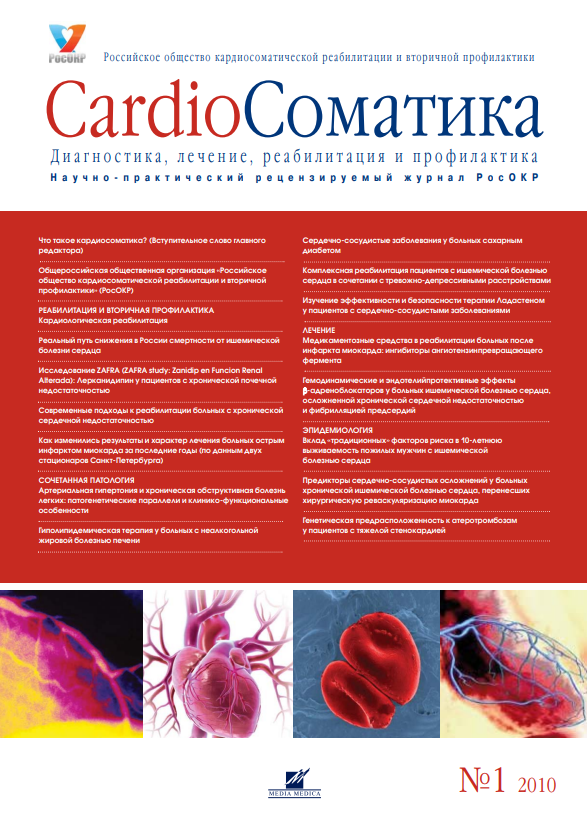Genetic predisposition to atherothromboses in patients with severe angina pectoris
- Authors: Chumakova G.A1,2, Momot A.P1,3, Kozarenko A.A1,2, Veselovskaya N.G2,4
-
Affiliations:
- Altai State Medical University, Barnaul
- Research Institute of Complex Problems of Cardiovascular Diseases, Siberian Branch, Russian Academy of Medical Sciences, Kemerovo
- Altai Branch, Hematology Research Center, Russian Academy of Medical Sciences
- Altai Territorial Cardiology Dispensary, Barnaul
- Issue: Vol 1, No 1 (2010)
- Pages: 80-83
- Section: Articles
- Submitted: 24.09.2020
- Published: 15.03.2010
- URL: https://cardiosomatics.ru/2221-7185/article/view/44989
- DOI: https://doi.org/10.26442/CS44989
- ID: 44989
Cite item
Full Text
Abstract
Objective. To study the prevalence of thrombosis allelic polymorphisms in patients with severe angina who have indications for myocardial revascularization. Design and methods. The study included 105 patients (87 men and 18 women) aged from 33 to 70 years who had angina III–IV functional class, with indications for myocardial revascularization. All the patients studied polymorphism of the inhibitor of tissue plasminogen activator I type (675 4G/5G) (PAI-I), mutations of the factor II-prothrombin (20210 G / A), mutations of the factor V Leiden (Arg 506 Gln) and polymorphism of the methylenetetrahydrofolate reductase (Ala 222 Val) (MTHFR). Results. The prevalence of these mutations and polymorphisms in patients with severe angina requiring revascularization of the myocardium in 3 times greater than in the group of healthy adolescents. Our data showed that the risk of severe angina is directly proportional, and the age of the clinical debut of CHD is inversely proportional to the number of studied genetic defects. Thrombophilic polymorphisms studied genes increases the effects of other cardiovascular risk factors such as male sex, smoking and leads to an earlier debut of clinical CHD. Conclusion. It is necessary to form the strategy of genetically-based population policy for the prevention of atherosclerosis, including coronary. Healthy persons with diagnosed thrombosis polymorphisms are need of active primary prevention of cardiovascular disease.
Full Text
Генетическая предрасположенность к атеротромбозам у пациентов с тяжелой стенокардией×
About the authors
G. A Chumakova
Altai State Medical University, Barnaul; Research Institute of Complex Problems of Cardiovascular Diseases, Siberian Branch, Russian Academy of Medical Sciences, Kemerovo
A. P Momot
Altai State Medical University, Barnaul; Altai Branch, Hematology Research Center, Russian Academy of Medical Sciences
A. A Kozarenko
Altai State Medical University, Barnaul; Research Institute of Complex Problems of Cardiovascular Diseases, Siberian Branch, Russian Academy of Medical Sciences, Kemerovo
N. G Veselovskaya
Research Institute of Complex Problems of Cardiovascular Diseases, Siberian Branch, Russian Academy of Medical Sciences, Kemerovo; Altai Territorial Cardiology Dispensary, Barnaul
References
- Fu L, Jin H, Song K et al. Relationship between gene polymorphism of the PAI-1 promoter and myocardial infarction. Chin Med J 2001; 114 (3): 266–69.
- Boekholdt S.M., Bijsterveld N.R., Moons A.H. et al. Genetic variation in coagulation and fibrinolytic proteins and their relation with acute myocardial infarction: a systematic review. Circulation 2001; 104: 3063–8.
- Zhan M, Zhou Y, Han Z. Plasminogen activator inhibitor-1 4G/5G gene polymorphism in patients with myocardial or cerebrovascular infarction in Tianjin, China. Chin Med J 2003; 116 (11): 1707–10.
- Gardemann A, Lohre J, Katz N et al. The 4G4G genotype of the plasminogen activator inhibitor 4G/5G gene polymorphism is associated with coronary atherosclerosis in patients at high risk for this disease. Thromb Haemost 1999;82 (3): 1121–6.
- Doggen C.J., Bertina R.M., Manger Cats V., et al. The 4G/5G polymorphism in the plasminogen activator inhibitor-1 gene is not associated with MI. Thromb Haemost 1999; 82: 115–20.
- Hoekstra T, Geleijnse J.M., Kluft C et al. 4G/4G genotype of PAI-1 gene is associated with reduce risk of stroke in elderly. Stroke 2003; 34: 2822–8.
- Anderson J.L., Muhlestein J.B., Habashi J et al. Lack of association of a common polymorphism of the plasminogen activator inhibitor-1 gene with coronary artery disease and myocardial infarction. J Am Coll Cardiol 1999; 34: 1778–83.
- Gardemann A, Arsic T, Katz N, Tillmanns H. The factor II G20210A and factor V G1691A gene transitions and coronary heart disease. Tromb Haemost 1999; 81 (2): 208–13.
- Ozmen F, Ozmen M.M., Ozalp N, Akar N. The prevalence of factor V (G1691A), MTHFR (C677T) and PT (G20210A) gene mutations in arterial thrombosis. Ulus Travma Acil Cerrahi Derg 2009; 15 (2): 113–9.
- Settin A, Dowaidar M, Abd-Al-Samad A et al. Frequency of factor V Leiden mutation in Egyptian cases with myocardial infarction. Hematology 2008; 13 (3): 170–4.
- Pastana C.L., Torres A, Blanco S et al. Factor V Leiden and the risk of venous thrombosis, myocardial infarction, and stroke: a case - control in Venezuela. Genet Test Mol Biomarkers 2009; 13 (4): 537–42.
- Ardissino D, Peyvandi F, Merlini P.A. et al. Factor V mutation in young survivors of MI. Tromb Haemost 1996; 75(5): 701–2.
- Момот А.П., Цывкина Л.П., Елыкомов В.А. и др. Ранние ишемические инсульты и гематогенные тромбофилии. Методическое пособие для врачей 2009; 23–5.
Supplementary files








